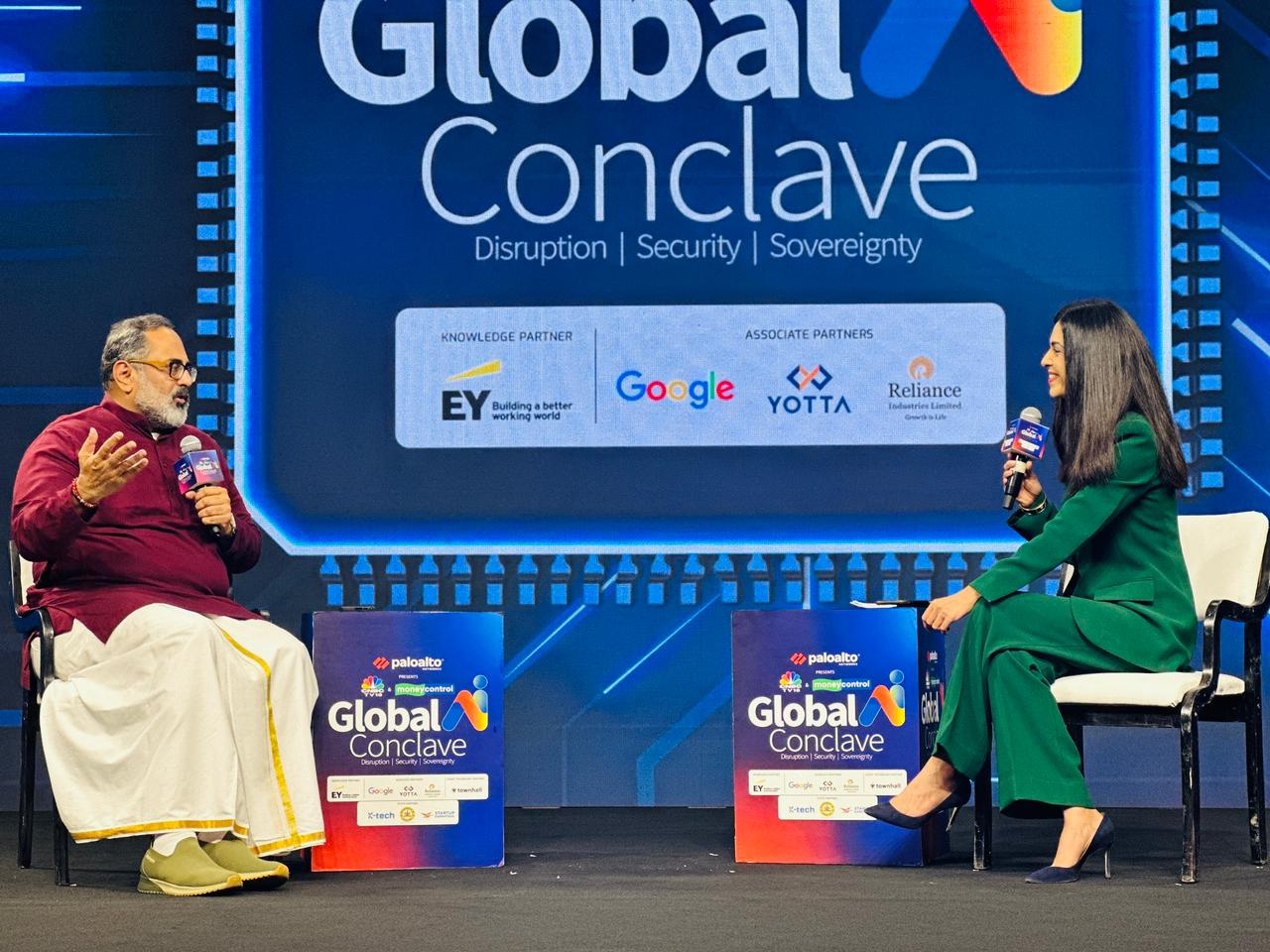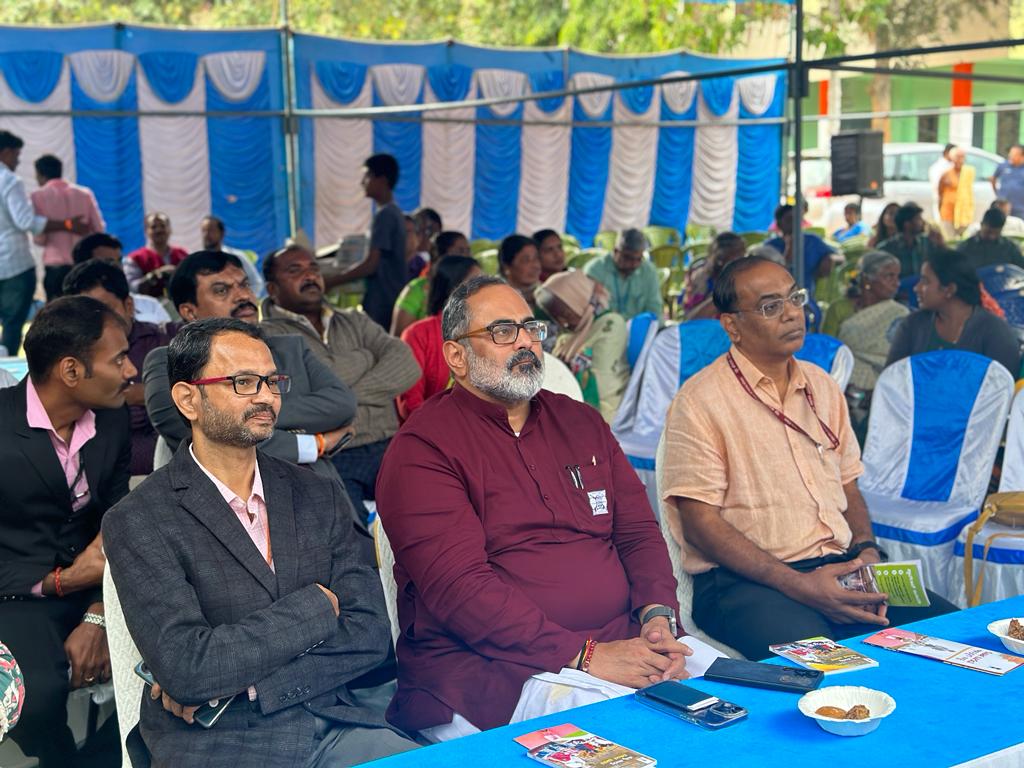Ministry of Electronics & IT
“We need a global framework urgently because, in the next 6-9 months, AI will take shape and evolve in a way that we may not anticipate or fully understand”: MoS Rajeev Chandrasekhar
“Just like the semiconductor model and framework we will be funding and supporting startups leveraging AI”: MoS Rajeev Chandrasekhar
“The Govt of India is focused on building an academic, industry, and startup research ecosystem in Artificial Intelligence”: MoS Rajeev Chandrasekhar
“We need our academic institutions to focus on talent that the AI ecosystem can absorb in the coming years”: MoS Rajeev Chandrasekhar
Minister Rajeev Chandrasekhar Engages in a Fireside Chat and Pays Respects at the National War Memorial in Bengaluru today
प्रविष्टि तिथि:
16 DEC 2023 6:40PM by PIB Delhi
Union Minister of State for Skill Development & Entrepreneurship, Electronics & IT and Jal Shakti Shri Rajeev Chandrasekhar participated in a fireside chat organized by MoneyControl in Bengaluru today, sharing insights on Artificial Intelligence (AI) and its potential impact on India. He highlighted that AI can Propel India’s digital economy, fostering growth in sectors such as healthcare, agriculture, and governance. He emphasized the positive influence AI could have on startups, expanding their opportunities and contributing to India’s overall development.
Shri Rajeev Chandrasekhar said, “We see AI as a significant bolt to the already galloping Indian digital economy, acting as a kinetic enabler. To enable the AI ecosystem, we have put together an overall framework that talks about AI compute capacity. The Government will deploy financial resources for building foundational models, Large Language Models (LLMs), and various use cases. Similar to the semiconductor model, we will fund startups as well. We maintain a clear focus on building an academic, industry, and startup research ecosystem, which we refer to as the Innovation and Research Center. There are many adjacent areas as well, including AI chips, where we will have an intersection between the semiconductor program and the India AI mission. AI compute will have two segments: one led by the private sector, similar to the design of the semiconductor ecosystem with incentivized investments. The other segment involves indigenously developed public sector capacity for AI emerging from C-DAC, which will be available to the Indian ecosystem.”
Ghd Minister highlighted the challenge of the chip shortage, noting that it is expected to resolve relatively quickly. He emphasized the need for India to shift its focus towards nurturing AI talent, anticipating a growing ecosystem in the future.

“The chip shortage is a problem that will go away the fastest. There are challenges like talent; this is an ecosystem that will need top-notch talent. We need postdocs, PhDs, and master’s graduates to emerge. What we need to do is for our academic institutions to focus on the kind of talent that this ecosystem will absorb in the coming years,” Shri Rajeev Chandrasekhar said.
The Minister emphasized that the Government of India has proactively addressed the challenges arising from the ubiquitous nature of the internet, addressing issues such as deepfakes, misinformation, and disinformation.

“We should focus on creating a global framework, not an American or European framework. The nature of the internet and our experiences on social media, the toxicity, and the crimes or harms it has shown us, that regardless of any country that has built rules and laws, the ubiquitous nature of the internet means that 80-90% of cybercrime or harms are extra-jurisdictional. The perpetrator may be in one jurisdiction, the victim in another, and the crimes in a third. Our approach is to ensure there are some principles, make sure there is a list of harms and criminalities as we see it today, and then keep adding to it as we encounter malicious models, biased, bigoted models, and algorithms. Deepfakes are a classic example because misinformation and patently false information are diseases that social media has spread, causing harm, especially in democratic countries. It creates divisions, incitements, and fake narratives. Misinformation has been a problem in social media; now imagine misinformation powered by AI,” the Minister further added.
Reflecting on the recently concluded GPAI, where 29 member nations discussed overarching principles and frameworks, the Minister remarked, “There is no way to avoid establishing certain principles. What GPAI has done this year in New Delhi—declaring that AI should be inclusive, avoiding a model where only a few countries have it and others don’t—is crucial. We need a global framework urgently because, in the next 6-9 months, AI will take shape and evolve in a way that we may not anticipate or fully understand. Therefore, we need to establish this framework quickly, with a granular set of principles and rules that all countries can follow. Since 2021, India has already taken steps to discuss openness, safety, trust, accountability, and legal accountability of platforms.”
Minister Shri Rajeev Chandrasekhar also paid his respects at the National War Memorial in Bengaluru, where he laid a wreath as part of his annual tradition to honor India’s bravehearts who served and sacrificed.
Later in the day, he took part in the Viksit Bharat Sankalp Yatra— a program designed to raise awareness among citizens about various welfare schemes and encourage their active participation in the spirit of "Jan Bhagidari” to achieve 100% saturation of these initiatives. This initiative, the largest-ever outreach program of the Government of India, aims to cover 2.60 lakh Gram Panchayats and 4000+ urban local bodies nationwide by January 25, 2024.
****
DK/DK/SMP
(रिलीज़ आईडी: 1987198)
आगंतुक पटल : 2356